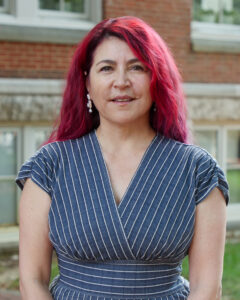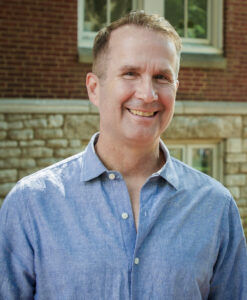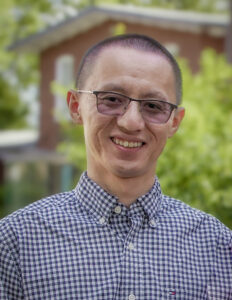
“Food, Nourishment, Identity”
Led by Carla Guerrón Montero
This engaging seminar, led by Dr. Carla Guerrón Montero from the Department of Anthropology, will explore the complexities of food beyond nourishment, looking at how food is tied to culture, identity, and power dynamics. Whether you’re passionate about teaching social studies, science, health, or cultural studies, this seminar offers valuable insights and practical tools for your classroom.
What to Expect:
● Discover food taboos, gender roles in food production, preparation, consumption, and food’s impact on identity
● Hands-on activities, from cooking classes at UD’s Vita Nova to exploring ethnic markets
● Thought-provoking discussions, interactive activities, and community-based exercises
Ideas & Themes to Apply in the Classroom:
● Health and Nutrition – the food system, public health, and allergies
● Food shortages and Droughts – food security, food insecurity, and food sovereignty
● Culinary Arts Pathways – nutritionist/dietitian, chef, food critic/writer
● Art – connecting with food, gastronomy, and cuisine through artists like Frida Kahlo
● Languages, History, Social Studies – how historical events influence culinary culture
● Social Studies & Culture – foods from home, connecting & showcasing diverse cultures
”Food is among the most mundane *and* essential parts of our lives. We need food to stay alive, but food is also a complex social fact. I am honored to have the opportunity to share my love for food in all its facets with experienced Delaware teachers. Together, we will explore the role of food as physical nourishment and a social marker to create inclusive and engaging learning experiences.”
– Carla Guerrón Montero

“Combatting Distraction and Disinformation”
Led by Matt Kinservik
This timely seminar, led by Professor Matt Kinservik from the Department of English, aims to empower your students to be mindful, critical thinkers in our digitally-driven world. You will explore the crucial issues of information bias, distraction, and disinformation affecting our students and society. Hands-on exercises like tracking TikTok and Instagram algorithms and engaging with guest speakers will offer real-world insights and tools to share with your students. The seminar will review historical examples of disinformation in UD’s Special Collections and take advantage of timely events sponsored by UD’s Center for Political Communication and other regional organizations.
We Will Explore:
● How technology, AI, and social media impact focus and information accuracy.
● Disinformation topics such as Climate Change, Politics, and the Pandemic.
● Strategies to understand and combat the manipulation tactics used by big tech.
● Practical activities, like self-reflection exercises, offline challenges, and critical
discussions about tech use and media literacy.
Ideas & Themes to Apply in the Classroom:
● Ethical use of AI – What’s appropriate and what’s not, teaching students the difference
● ELA & Social Studies – Selecting/evaluating sources, confirmation bias, source
authenticity, and how algorithms impact search queries
● History – Disinformation and propaganda
● Art – Imagery in a historical context, contemporary technology, appropriate use of AI
● Social-Emotional-Learning – How are you being manipulated to feel a certain way?
“We live in a brave new world in which technology and social media have ushered in rapid changes in how we receive and how we perceive information. We are communicating at a speed and scale unknown in human history–and we’re not very good at it. At least not yet. I think it’s critical that educators and students at all levels consciously address the challenges of distraction and disinformation. The technology and pace of change are not going away, but we can learn to manage our lives and democracy better by focusing on these issues.”
– Matt Kinservik
“World in a Grain of Sand”

Led by Yafei Ren
This engaging seminar, led by Dr. Yafei Ren from the Department of Physics and Astronomy, explores the mesmerizing world hidden within a grain of sand, revealing the geometric patterns, symmetries, and topological characteristics that shape the natural world. As a seminar fellow, you will gain insights into how these principles connect to real-world phenomena and
cutting-edge research through a visit to UD’s Mineralogical Museum, a guided nature walk, and
hands-on activities such as creating Moiré patterns and modeling crystal structures. This
seminar aims to equip you with practical tools and inspiring content to captivate your students and connect math and science to the world around them.
Ideas & Themes to Apply in the Classroom:
● Math, Geometry, Biomimicry – Applications in the real world
● Science – How, where, and why patterns form
● Art – Tessellations, mandalas, kaleidoscopes, photography, design, light & color,
symmetry, leaf rubbings, cyanotypes
● Music – Examples of repeating sounds in nature, bird calls, insect songs & waves
“My journey from a small village to becoming a professor has demonstrated the transformative
power of passionate educators. I’m eager to share my expertise and experiences with K-12
educators, working together to ignite that same passion and build a brighter future in K-12
education.”
– Yafei Ren
